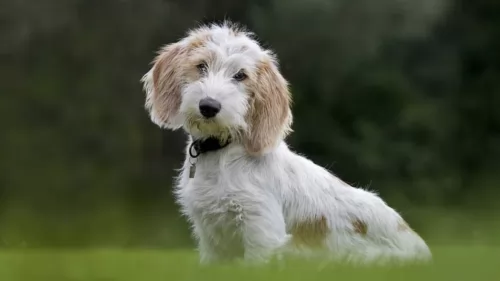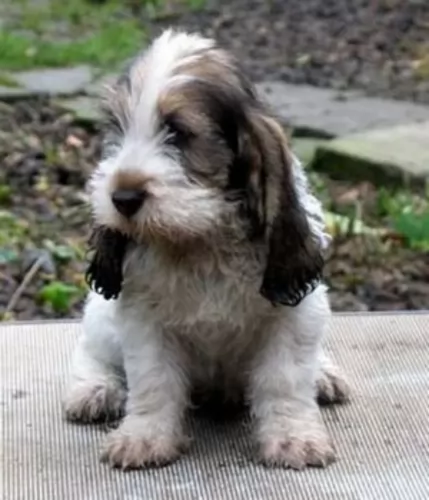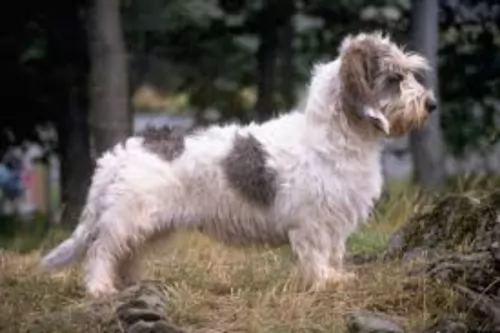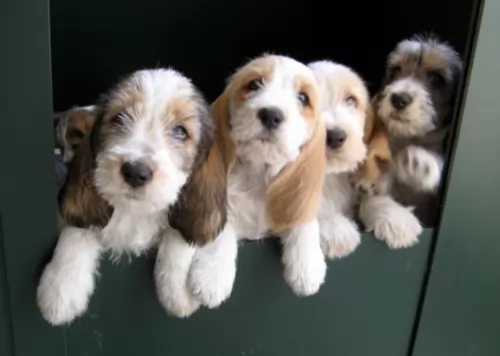 Petzlover
Petzlover Petit Basset Griffon Vendeen is originated from France but Tibetan Mastiff is originated from China. Petit Basset Griffon Vendeen may grow 43 cm / 16 inches shorter than Tibetan Mastiff. Petit Basset Griffon Vendeen may weigh 70 kg / 154 pounds lesser than Tibetan Mastiff. Both Petit Basset Griffon Vendeen and Tibetan Mastiff has same life span. Both Petit Basset Griffon Vendeen and Tibetan Mastiff has same litter size. Both Petit Basset Griffon Vendeen and Tibetan Mastiff requires Moderate Maintenance.
Petit Basset Griffon Vendeen is originated from France but Tibetan Mastiff is originated from China. Petit Basset Griffon Vendeen may grow 43 cm / 16 inches shorter than Tibetan Mastiff. Petit Basset Griffon Vendeen may weigh 70 kg / 154 pounds lesser than Tibetan Mastiff. Both Petit Basset Griffon Vendeen and Tibetan Mastiff has same life span. Both Petit Basset Griffon Vendeen and Tibetan Mastiff has same litter size. Both Petit Basset Griffon Vendeen and Tibetan Mastiff requires Moderate Maintenance.
 The Petit Basset Griffon Vendéen hails from France. They have always been used to hunt game by scent. This dog has always been appreciated for its independence and the fact that is is mentally focused and fit.
The Petit Basset Griffon Vendéen hails from France. They have always been used to hunt game by scent. This dog has always been appreciated for its independence and the fact that is is mentally focused and fit.
These dogs, referred to as the PBGV descend from the larger Griffon Vendeen, which comes in four distinct sizes. The first official French standard for this dog was published in 1898. It was in 1909 that a revised standard for the dog recognized two distinct varieties.
The first PBGVs were imported to the United States in 1983 and the Petit Basset Griffon Vendeen Club of America was founded in 1984.
 The Tibetan Mastiff is still considered to be a primitive breed originating in Tibet centuries ago. The breed was developed to guard property and livestock. They still do this as well as being a much loved family dog and a show dog as well. There is very little history that is documented for the breed prior to the 19th century.
The Tibetan Mastiff is still considered to be a primitive breed originating in Tibet centuries ago. The breed was developed to guard property and livestock. They still do this as well as being a much loved family dog and a show dog as well. There is very little history that is documented for the breed prior to the 19th century.
Believed to be centuries old with ancestors who are mastiff like dogs that developed into two different types of Tibetan Mastiffs. These types are the Tsang-Khyi and the Do-Khyi. The Tsang Khyi were guardians for Tibetan monks, while the Tsang-Khyi guarded flocks for nomadic shepherds and in villages.
The first Tibetan Mastiff was imported in 1847 to England and presented as a gift to Wueen Victoria, from India’s Viceroy. By 1873 there was an English Kennel Club and the breed was labeled a large dog from Tibet and entered into the EKC Stud Book.
The next year the future King Edward VII, brought another two Tibetan Mastiffs to the United Kingdom to show in 1875. The first breed club began in 1931. The world wars interfered and no new dogs were imported to England until 1976. Two dogs were given to the President of the United States in the late 1950’sbut were not bred and it wasn’t until 1970 that any more were imported. The US Tibetan Mastiff Club was not founded until 1974 and they were first entered in a National Specialty show in 1979.
In 2007 the AKC recognized the breed as a working dog since 2007. It’s hard to find a purebred Tibetan Mastiff in Tibet anymore.
 Both male and female dogs are much the same in size, standing at between 32 and 40cm and weighing between 15 to 20 kilograms.
Both male and female dogs are much the same in size, standing at between 32 and 40cm and weighing between 15 to 20 kilograms.
These are solid dogs with fairly short legs and a harsh double coat that is medium length and rough. The coloring is essentially white with patches of orange, lemon, tan or black. The dog has a general tousled appearance with quite a bit of hair around the face. The ears are set low and are floppy while the tail is medium length and held high.
The Petit Basset Griffon Vendeen is a friendly, social, outgoing dog that is good with children and other dogs. He is stubborn and should be trained and socialized so that he is well mannered around people and so that he also obeys simple commands.
They are quite noisy dogs, ‘talking’ to other dogs with a howl and bark.
 Both types of Mastiffs can be present in the same litter, so that both larger and smaller pups are present. Both types are well-muscled and structured. Today’s dogs being developed in China and the West are much larger than the previous ones. These dogs would be less useful to the nomads and cost too much to feed. Today’s dog is very large with a large head and a long double coat. This coat can be black, brown, gold, and blue, with or without tan markings. There are now a few white Tibetan Mastiffs being bread.
Both types of Mastiffs can be present in the same litter, so that both larger and smaller pups are present. Both types are well-muscled and structured. Today’s dogs being developed in China and the West are much larger than the previous ones. These dogs would be less useful to the nomads and cost too much to feed. Today’s dog is very large with a large head and a long double coat. This coat can be black, brown, gold, and blue, with or without tan markings. There are now a few white Tibetan Mastiffs being bread.
The breed standard for the Mastiff is different in the West than in the East. In the East the breed is broken into two categories – the Lion Head and the Tiger head.
 The Petit Basset Griffon Vendéen is known for his amicable characteristics. They’re also intelligent, curious dogs and will respond well to training and socialization.
The Petit Basset Griffon Vendéen is known for his amicable characteristics. They’re also intelligent, curious dogs and will respond well to training and socialization.
Apart from getting on well with children in the home, they also get on well with other dogs. They’re independent and strong willed and can be inclined to bark a bit to make himself known. It is why he is best suited to a home in the suburbs or countryside where his barking won’t disturb close-living neighbors, although training and socialization should change this habit. With training, this dog can become a most wonderful friend and pet.
 Average longevity of these dogs is about 12, 13, or 14 years if he gets looked after well.
Average longevity of these dogs is about 12, 13, or 14 years if he gets looked after well.
Eyes and joints are always a problem with the Petit and several of the eye diseases dogs get can actually lead to blindness.
Corneal wounds are fairly common in dogs. The cornea can be injured and lacerations can damage the eye. You’ll see your pet rubbing at the affected eye.
Hip joints can cause lameness and pain. Dogs can develop hip and joint problems at any age. Joint problems can be better eliminated by providing the dog with good nutrition and exercise. If your dog is obese, joint problems can be more severe. Weight loss can reduce the signs of joint pain in dogs.
 Though considered a primitive dog and isolated for several centuries, so they should not have as many genetic or inherited conditions as other dogs with more cross and in-breeding. These are the potential health issues they might develop:
Though considered a primitive dog and isolated for several centuries, so they should not have as many genetic or inherited conditions as other dogs with more cross and in-breeding. These are the potential health issues they might develop:
Elbow and Hip dysplasia – can lead to lameness and arthritis.
OCD Osteochondrois Dissecans – this is also an orthopedic condition when the soft tissue growth is abnormal in the joints. It is painful and the joint is stiff. Don’t breed a dog that has this condition.
Panosteitis – Canine growing pains. Inflammation of the long bones in large dogs as they grow. They will eventually out grow it. Pain can be managed through medication.
Autoimmune Hypothyroidism – Hormone deficiency leading to flaky skin, weight gain and lack of energy. Can be managed through medication.
Canine Inherited Demyelinative Neuropathy – If your Tibetan Mastiff is going to have this condition, they will have it by six weeks of age. Weakness in the hind legs leading to paralysis.
Bloat – deadly if not treated immediately and related to dietary habits.
 These are active dogs and they will like a daily walk to burn off some of their excess energy. They can adapt to living in the city or the countryside but they will certainly need to receive exercise wherever they are. Buy him some toys and a ball and throw it for him – this can be a wonderful form of exercise for your 4-legged friend.
These are active dogs and they will like a daily walk to burn off some of their excess energy. They can adapt to living in the city or the countryside but they will certainly need to receive exercise wherever they are. Buy him some toys and a ball and throw it for him – this can be a wonderful form of exercise for your 4-legged friend.
They need to be brushed at least twice a week to avoid matting and tangles. Some people opt to have the coat stripped. This is either done by hand or with a special stripping tool. Some dog owners prefer to hand the dog in for a professional cut, but this can alter the texture of the coat.
Because of the floppy ears, they will need regular ear cleanings to prevent ear infections brought about by dirt, wax and moisture within the ear.
He will also need to have his paw nails clipped. He can’t tell you about aching teeth, so do your canine friend a favor and check inside his mouth to ensure that all his teeth are still in tip top condition. Bad teeth can cause all kinds of illnesses and even affect the heart and kidneys.
The nutritional needs of your Petit Basset Griffon Vendeen are very important if your want your pet to enjoy good health.
Vitamins and minerals are an essential part of his nutrition, and luckily the top quality commercially manufactured dog foods see to it that the food has essential nutrients in them. With the best ones, your pet can expect a balanced diet.
Try and avoid the lower quality foods as these have toxic fillers and unhealthy ingredients in them that can make your pet sick.
Give him some home-made food too. You can chop this food up and mix it into his kibble occasionally to give him a healthy tasty treat. The best thing about dogs as pets is that they love their food to be simple and nutritious. Boiled chicken, brown rice or pasta and some healthy vegetables such as spinach, carrots and sweet potato will do him the world of good.
If you can, a little bit of raw meat from time to time can also be excellent for him. Make sure he is never without a bowl of fresh, cool water.
 Don’t feed the puppy too much protein as you want to prevent Panosteitis and growing too quickly. Do not overfeed. Feed 4-5 cups of high quality large breed puppy food in 3-4 meals day.
Don’t feed the puppy too much protein as you want to prevent Panosteitis and growing too quickly. Do not overfeed. Feed 4-5 cups of high quality large breed puppy food in 3-4 meals day.
4 to 6 or more cups of a high-quality dog food daily, divided into two meals. To avoid bloat do not feed before or after vigorous exercise.
Calm and laid back when inside.
They need 20-30 minutes of vigorous exercise and play daily. They prefer to play with other large dogs.